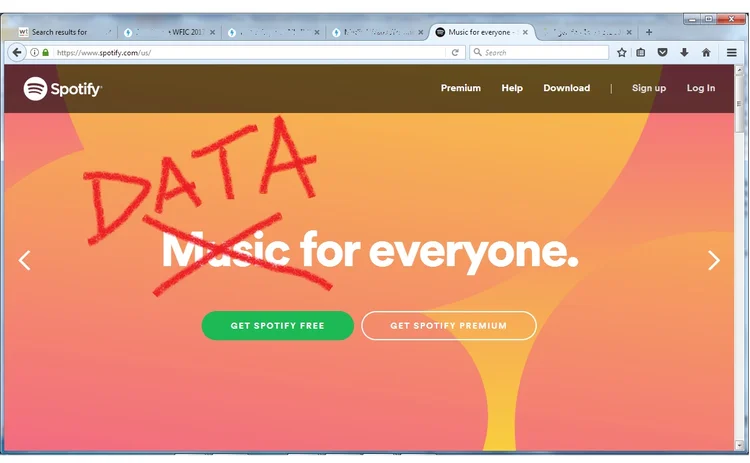WFIC 2017: Could Spotify Shape Data Consumption?
Panelists say current market data licensing practices are stuck in the past, and should evolve along similar lines to the music industry, which has dealt with similar intellectual property challenges.

Before Spotify took off around five years ago, musicians and record labels who owned the intellectual property were faced with huge challenges, caused by a shift in way people were consuming music. Piracy was rife across the internet, leading to millions of dollars in lost revenues. Streaming sites such as Spotify, which give subscribers unlimited access to a catalogue of music, have reinvented the way we view intellectual property. Panelists on Monday agreed that music streaming platforms have to a degree broken the separation between the record providers and the consumer, giving them the ability to control content, and consume what they want, when they want it. With market data users wanting to consume data in this way, and with providers and aggregators constantly on the lookout for new pricing models, mirroring a model like Spotify could bridge the gap between the two.
One vice president of market data at a buy-side firm described the hope for Spotify-type model as an “I have a dream” topic, but said they hope the industry will be able to create a marketplace where all available data is available and easy to access from one place—or “a world where we don’t have to have individual connections to individual suppliers to access every data-byte that we need.” The marketplace would enable consumers to “access the elements of data that are actually required, and pay for what is used, no more, in an efficient and streamlined way,” the VP said.
A global head of market data at a bank said the “attractive thing about looking at the characteristics of Spotify is the ability for end-consumers to be able to curate what they want, how they want, and when…. It’s not about reducing the value of data to just a commodity; this is more about access. There is a shared responsibility—not only from a provider perspective, but I would hold all the consumers responsible for better articulating what our requirements are… there needs to be a collaborative relationship,” they said.
A head of market data for EMEA at a bank urged data vendors to also think about the positives of this model over the three-day WFIC event. “Data vendors are always concerned about realizing the full value of their data. This approach is not about devaluing data, but about making information easier to get to, and using technology to achieve efficiency,” the bank exec said.
Attendees will be able to contribute their support or thoughts on ‘the dream’ during roundtables on Tuesday. Vendors and exchanges will debate the subject during panels on Wednesday.
Click here to return to our WFIC hub for all the latest stories from the event
Only users who have a paid subscription or are part of a corporate subscription are able to print or copy content.
To access these options, along with all other subscription benefits, please contact info@waterstechnology.com or view our subscription options here: http://subscriptions.waterstechnology.com/subscribe
You are currently unable to print this content. Please contact info@waterstechnology.com to find out more.
You are currently unable to copy this content. Please contact info@waterstechnology.com to find out more.
Copyright Infopro Digital Limited. All rights reserved.
As outlined in our terms and conditions, https://www.infopro-digital.com/terms-and-conditions/subscriptions/ (point 2.4), printing is limited to a single copy.
If you would like to purchase additional rights please email info@waterstechnology.com
Copyright Infopro Digital Limited. All rights reserved.
You may share this content using our article tools. As outlined in our terms and conditions, https://www.infopro-digital.com/terms-and-conditions/subscriptions/ (clause 2.4), an Authorised User may only make one copy of the materials for their own personal use. You must also comply with the restrictions in clause 2.5.
If you would like to purchase additional rights please email info@waterstechnology.com
More on Emerging Technologies
Tape bids, algorithmic trading, tariffs fallout and more
The Waters Cooler: Bloomberg integrates events data, SimCorp and TSImagine help out asset managers, and Big xyt makes good on its consolidated tape bid in this week’s news roundup.
DeepSeek success spurs banks to consider do-it-yourself AI
Chinese LLM resets price tag for in-house systems—and could also nudge banks towards open-source models.
Standard Chartered goes from spectator to player in digital asset game
The bank’s digital assets custody offering is underpinned by an open API and modular infrastructure, allowing it to potentially add a secondary back-end system provider.
Saugata Saha pilots S&P’s way through data interoperability, AI
Saha, who was named president of S&P Global Market Intelligence last year, details how the company is looking at enterprise data and the success of its early investments in AI.
Data partnerships, outsourced trading, developer wins, Studio Ghibli, and more
The Waters Cooler: CME and Google Cloud reach second base, Visible Alpha settles in at S&P, and another overnight trading venue is approved in this week’s news round-up.
Are we really moving on from GenAI already?
Waters Wrap: Agentic AI is becoming an increasingly hot topic, but Anthony says that shouldn’t come at the expense of generative AI.
Cloud infrastructure’s role in agentic AI
The financial services industry’s AI-driven future will require even greater reliance on cloud. A well-architected framework is key, write IBM’s Gautam Kumar and Raja Basu.
Waters Wavelength Ep. 310: SigTech’s Bin Ren
This week, SigTech’s CEO Bin Ren joins Eliot to discuss GenAI’s progress since ChatGPT’s emergence in 2022, agentic AI, and challenges with regulating AI.








